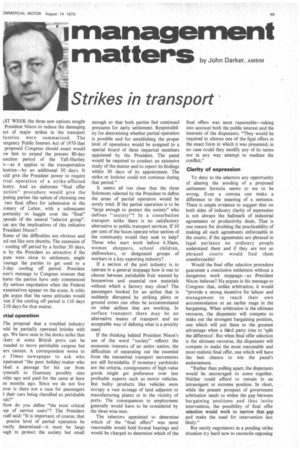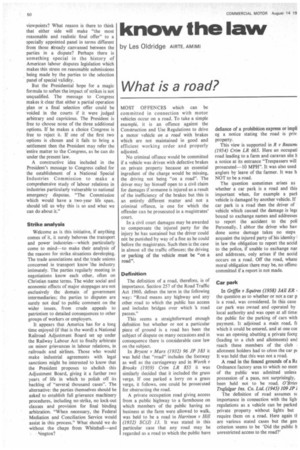management
Page 51

Page 52

If you've noticed an error in this article please click here to report it so we can fix it.
matters by John Darker, AMBIM
Strikes in transport
k ST WEEK the three new options sought President Nixon to reduce the damaging ect of major strikes in the transport lustries were summarized. The lergency Public Interest Act of 1970 that proposed Congress should enact would Dw him to extend the present 80-day unction period of the Taft-Hartley .t—as it applies to the transportation lustries—by an additional 30 days. It iuld give the President power to require rtial operation of a strike affected lustry. And an elaborate "final offer ection" procedure would give the puting parties the option of choosing one two final offers for submission to the :retary of Labor, with a subsequent portunity to haggle over the "final" )posals of the neutral "selector group". hat are the implications of this initiative President Nixon?
Some of the difficulties are obvious and nd out like sore thumbs. The extension of : cooling off period by a further 30 days, Ti by the President as attractive if the pute were close to settlement, might :ourage the parties to get used to a 0-day cooling off period. President xon's message to Congress stresses that herto the parties have only commenced illy serious negotiation when the Federal iresentatives appear on the scene. A critic ght argue that the same attitudes would -sist if the cooling off period is 110 days 210 days for that matter.
rtial operation
The proposal that a troubled industry )uld be partially operated bristles with igs. We have seen in the docks strike that :kers at some British ports can be .suaded to move perishable cargoes but iers cannot. A correspondent wrote to e Times newspaper to ask who npensated "the poor holiday-maker who )ked a passage for his car from ;ymouth to Guernsey possibly nine ,nths ago and paid for the same at least ee months ago. Since we do not live ever is there not a case for passengers
their cars being classified as perishable )ds?"
How do you define "the most critical lup of service users"? The President iself said: "It is important; of course, that precise level of partial operation be Tectly determined—it must be large iugh to protect the society but small enough so that both parties feel continued pressures for early settlement. Responsibility for determining whether partial operation is possible and for establishing the proper level of operations would be assigned to a special board of three impartial members appointed by the President. The panel would be required to conduct an extensive study of the matter and to report its findings within 30 days of its appointment. The strike or lockout could not continue during that period."
It seems all too clear that the three Solomons selected by the President to define the areas of partial operation would be sorely tried. If the partial operation is to be "large enough to protect the society" who defines "society"? In a conurbation transport strike there is no satisfactory alternative to public transport services. If 10 per cent of the buses operate what section of the community would they seek to help? Those who start work before 6.30am, women shoppers, school children, shiftworkers, or designated groups of workers in a key exporting industry?
If a section of the port industry is to operate in a general stoppage how is one to choose between perishable fruit wanted by housewives and essential raw materials without which a factory may close? The passengers booked for an airline that is suddenly disrupted by striking pilots or ground crews can often be accommodated on other airlines that are working. In surface transport there may be no alternative means of transport and no acceptable way of defining what is a priority need.
If the thinking behind President Nixon's use of the word "society" reflects the economic interests of an entire nation, the difficulties of separating out the essential from the inessential transport movements are still formidable. If monetary yardsticks are the criteria, consignments of high-value goods might get preference over less profitable exports such as motor vehicles. But bulky products like vehicles soon occupy a vast acreage of land adjacent to manufacturing plants or in the vicinity of ports. The consequences to employment generally would have to be considered by the three wise men.
The selectors appointed to determine which of the "final offers" was most reasonable would hold formal hearings and would be charged to determine which of the final offers was most reasonable—taking into account both the public interest and the interests of the disputants. "They would be required to choose one of the final offers in the exact form in which it was presented; in no case could they modify any of its terms nor in any way attempt to mediate the conflict."
Clarity of expression To deny to the selectors any opportunity of altering the wording of a proposed settlement formula seems to me to be wrong. Even a comma can make a difference to the meaning of a sentence. There is ample evidence to suggest that on both sides of industry clarity of expression is not always the hallmark of industrial agreements or productivity deals. That is one reason for doubting the practicability of making all such agreements enforceable in the courts; if the agreements are phrased in legal parlance no ordinary people understand them and if they are not so phrased courts would find them unenforceable!
Would the final offer selection procedure guarantee a conclusive settlement without a dangerous work stoppage—as President Nixon believes? He argues in his message to Congress that, unlike arbitration, it would "provide a strong incentive for labour and management to reach their own accommodation at an earlier stage in the bargaining. When arbitration is the ultimate recourse, the disputants will compete to stake out the strongest bargaining position, one which will put them to the greatest advantage when a third party tries to 'split the difference'. But when final offer selection is the ultimate recourse, the disputants will compete to make the most reasonable and most realistic final offer. one which will have the best chance to win the panel's endorsement.
"Rather than pulling apart, the disputants would be encouraged to come together. Neither could afford to remain in an intransigent or extreme position. In short, while the present prospect of government arbitration tends to widen the gap between bargaining positions and thus invite intervention, the possibility of final offer selection would work to narrow that gap and make the need for intervention less likely."
But surely negotiators in a pending strike situation try hard now to reconcile opposing viewpoints? What reason is there to think that either side will make "the most reasonable and realistic final offer" to a specially appointed panel in terms different from those already canvassed between the parties in a dispute? Perhaps there is something special in the history of American labour disputes legislation which makes this stress on reasonable submissions being made by the parties to the selection panel of special validity.
But the Presidential hope for a magic formula to soften the impact of strikes is not unqualified. The message to Congress makes it clear that either a partial operation plan or a final selection offer could be voided in the courts if it were judged arbitrary and capricious. The President is free to choose none of the three additional options. If he makes a choice Congress is free to reject it. If one of the first two options is chosen and it fails to bring a settlement then the President may refer the entire matter to the Congress, as he can do under the present law.
A constructive idea included in the President's message to Congress called for the establishment of a National Special Industries Commission to make a comprehensive study of labour relations in industries particularly vulnerable to national emergency disputes. "The Commission which would have a two-year life span, should tell us why this is so and what we can do about it."
Strike analysis Welcome as is this initiative, if anything comes of it, it surely behoves the transport and power industries—which particularly come to mind—to make their analysis of the reasons for strike situations developing. The trade associations and the trade unions concerned in transport know the industry intimately. The parties regularly meeting in negotiations know each other, often on Christian name terms. The wider social and economic effects of major stoppages are not exclusively the domain of government intermediaries; the parties to disputes are surely not deaf to public comment on the wider issues, from crude appeals to patriotism to detailed consequences to other groups of workers or employers.
It appears that America has for a long time enjoyed (if that is the word) a National Railroad Adjustment Board set up under the Railway Labour Act to finally arbitrate on minor grievances in labour relations, in railroads and airlines, Those who would make industrial agreements with legal sanctions might be interested to know that the President proposes to abolish this Adjustment Board, giving it a further two years of life in which to polish off its backlog of "several thousand cases". The alternative: the parties themselves should be asked to establish full grievance machinery procedures, including no-strike, no lock-out clauses and provision for final binding arbitration. "When necessary, the Federal Mediation and Conciliation Service would assist in this process." What should we do without the chaps from Whitehall—and
,iington?




























































































